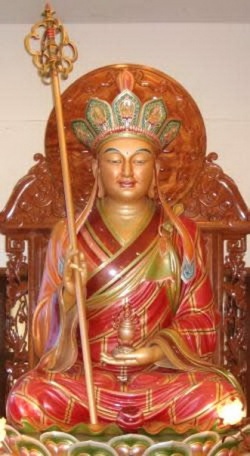Difference between revisions of "Dharmaraksa"
| Line 1: | Line 1: | ||
[[File:Kshitigarbha27.jpg|thumb|250px|]] | [[File:Kshitigarbha27.jpg|thumb|250px|]] | ||
| − | [[Dharmarakṣa]] ({{Wiki|Chinese}}: [[竺法護]]; pinyin: [[Zhú Fǎhù]]) was one a [[translators]] of [[Mahayana]] [[Buddhist]] [[scriptures]] into {{Wiki|Chinese}}. Scriptural catalogues describe him as of {{Wiki|Yuezhi}} origin. His family lived at {{Wiki|Dunhuang}}, where he was born around 230 CE. At the age of eight, he adopted the [[name]] of his [[master]], an [[Indian]] [[Monk]] named [[Zhu Gaozuo]] ({{Wiki|Chinese}}: [[竺高座]]).[[Dharmarakṣa]] came from [[India]] and worked with [[Kashyapamatanga]] in the translation of [[sutras]]. [[Dharmaraksa]]; [[Dharmaraksa]] (A.D. 223-300) was the {{Wiki|Chinese}} born descendant of {{Wiki|Iranian}} who had settled in [[West]] [[China]] generations before. He had translated the [[Lotus Sutra]] in A.D. 286. | + | [[Dharmarakṣa]] ({{Wiki|Chinese}}: [[竺法護]]; pinyin: [[Zhú Fǎhù]]) was one a [[translators]] of [[Mahayana]] [[Buddhist]] [[scriptures]] into {{Wiki|Chinese}}. [[Scriptural]] catalogues describe him as of {{Wiki|Yuezhi}} origin. His family lived at {{Wiki|Dunhuang}}, where he was born around 230 CE. At the age of eight, he adopted the [[name]] of his [[master]], an [[Indian]] [[Monk]] named [[Zhu Gaozuo]] ({{Wiki|Chinese}}: [[竺高座]]).[[Dharmarakṣa]] came from [[India]] and worked with [[Kashyapamatanga]] in the translation of [[sutras]]. [[Dharmaraksa]]; [[Dharmaraksa]] (A.D. 223-300) was the {{Wiki|Chinese}} born descendant of {{Wiki|Iranian}} who had settled in [[West]] [[China]] generations before. He had translated the [[Lotus Sutra]] in A.D. 286. |
As a young boy, [[Dhamaraksa]] is said to have travelled to many countries in the {{Wiki|Western}} Regions and learned {{Wiki|Central Asia}}n [[languages]] and scripts. He then traveled back to {{Wiki|China}} with a {{Wiki|quantity}} of [[Buddhist texts]] and worked on {{Wiki|translations}} with a {{Wiki|Chinese}}, [[Nie Chengyuan]]. | As a young boy, [[Dhamaraksa]] is said to have travelled to many countries in the {{Wiki|Western}} Regions and learned {{Wiki|Central Asia}}n [[languages]] and scripts. He then traveled back to {{Wiki|China}} with a {{Wiki|quantity}} of [[Buddhist texts]] and worked on {{Wiki|translations}} with a {{Wiki|Chinese}}, [[Nie Chengyuan]]. | ||
Revision as of 16:53, 10 September 2014
Dharmarakṣa (Chinese: 竺法護; pinyin: Zhú Fǎhù) was one a translators of Mahayana Buddhist scriptures into Chinese. Scriptural catalogues describe him as of Yuezhi origin. His family lived at Dunhuang, where he was born around 230 CE. At the age of eight, he adopted the name of his master, an Indian Monk named Zhu Gaozuo (Chinese: 竺高座).Dharmarakṣa came from India and worked with Kashyapamatanga in the translation of sutras. Dharmaraksa; Dharmaraksa (A.D. 223-300) was the Chinese born descendant of Iranian who had settled in West China generations before. He had translated the Lotus Sutra in A.D. 286.
As a young boy, Dhamaraksa is said to have travelled to many countries in the Western Regions and learned Central Asian languages and scripts. He then traveled back to China with a quantity of Buddhist texts and worked on translations with a Chinese, Nie Chengyuan.
Dharmaraksa came to the Chinese capital of Luoyang in 266 CE. There, he made the first known translations of the Lotus Sutra and the Dasabhumika Sutra, which were to become some of the classic texts of Chinese Mahayana Buddhism. Altogether, Dharmaraksa translated around 154 Hīnayāna and Mahāyāna Sutras, representing most of the important texts of Buddhism available in the western regions.
Some of his main works are:
- The Saddharmapundarika Sūtra (Chinese: 正法華經; pinyin: Zhèng Fǎhuá Jīng)
- The Panca Vimsati Sāhasrikā Prajnaparamita Sūtra (Chinese: 光贊般若波羅密經; pinyin: Guāngzàn Bānruòbōluómì Jīng)
- The Dasabhūmika-Sūtra (Chinese: 漸備一切智德經; pinyin: Jiànbèi Yīqiè Zhìdé Jīng)
- The Lalitavistara (Chinese: 普曜經; pinyin: Pǔyào Jīng)
See other text associated with him in Kanji.zinbun.kyoto-u.ac.jp
His proselytizing is said to have converted many to Buddhism in China, and made Chang'an (present-day Xi'an), a major center of Buddhism.
